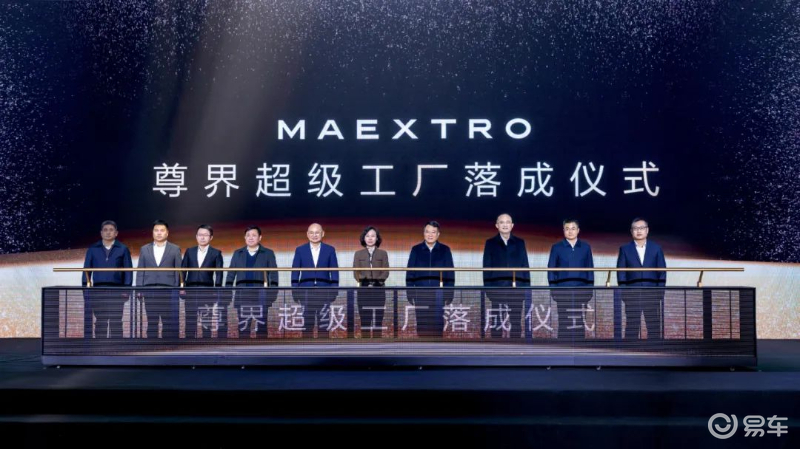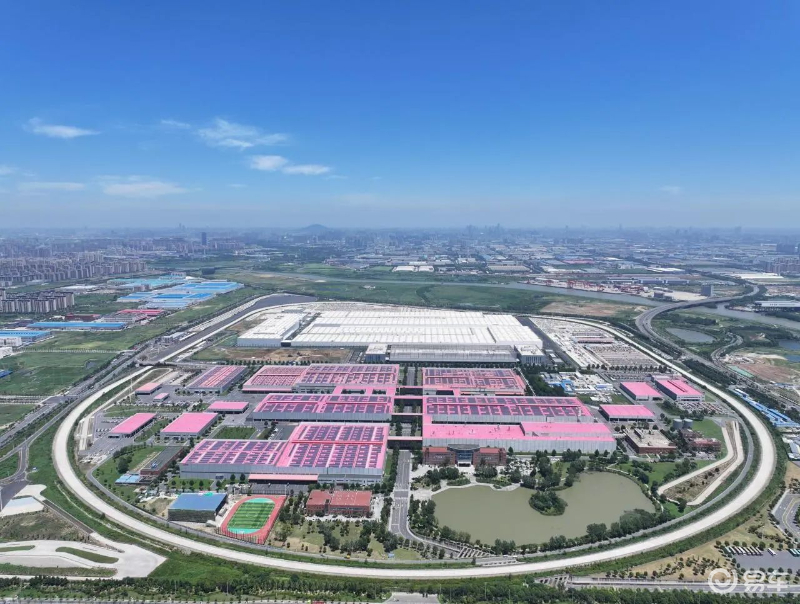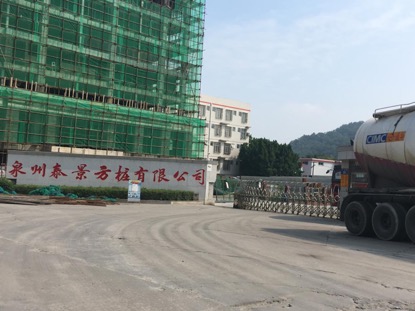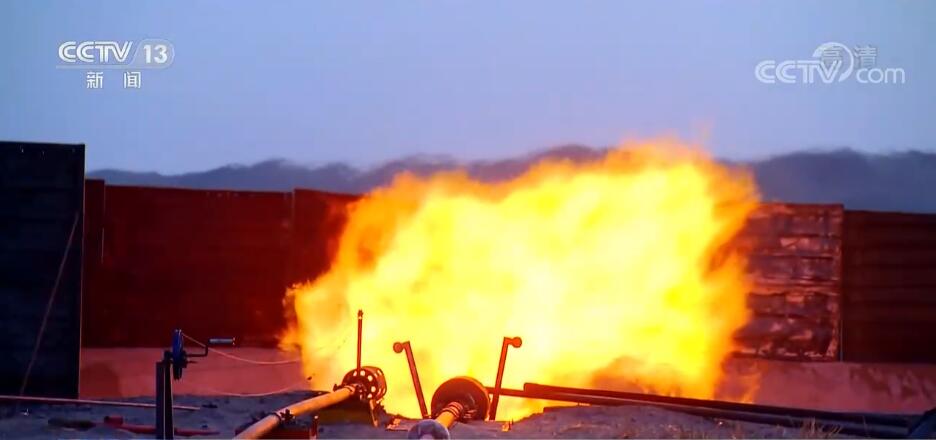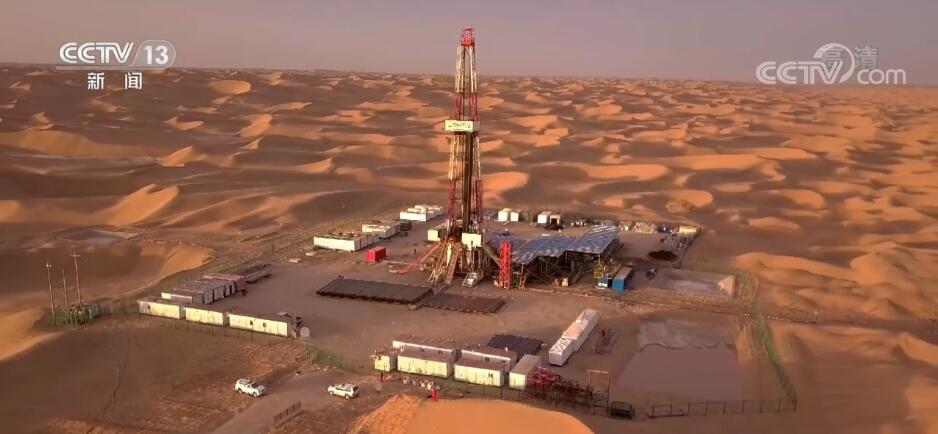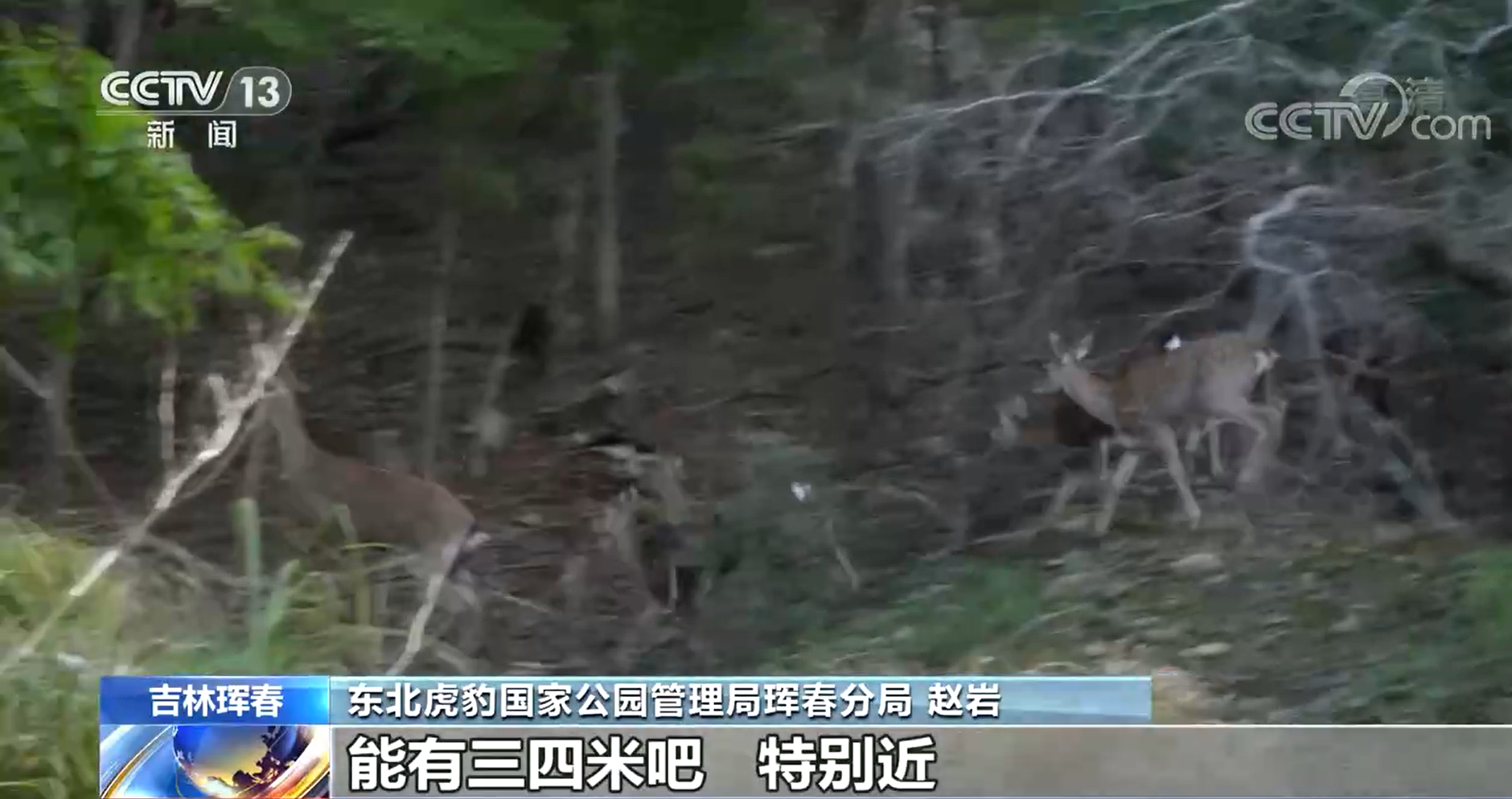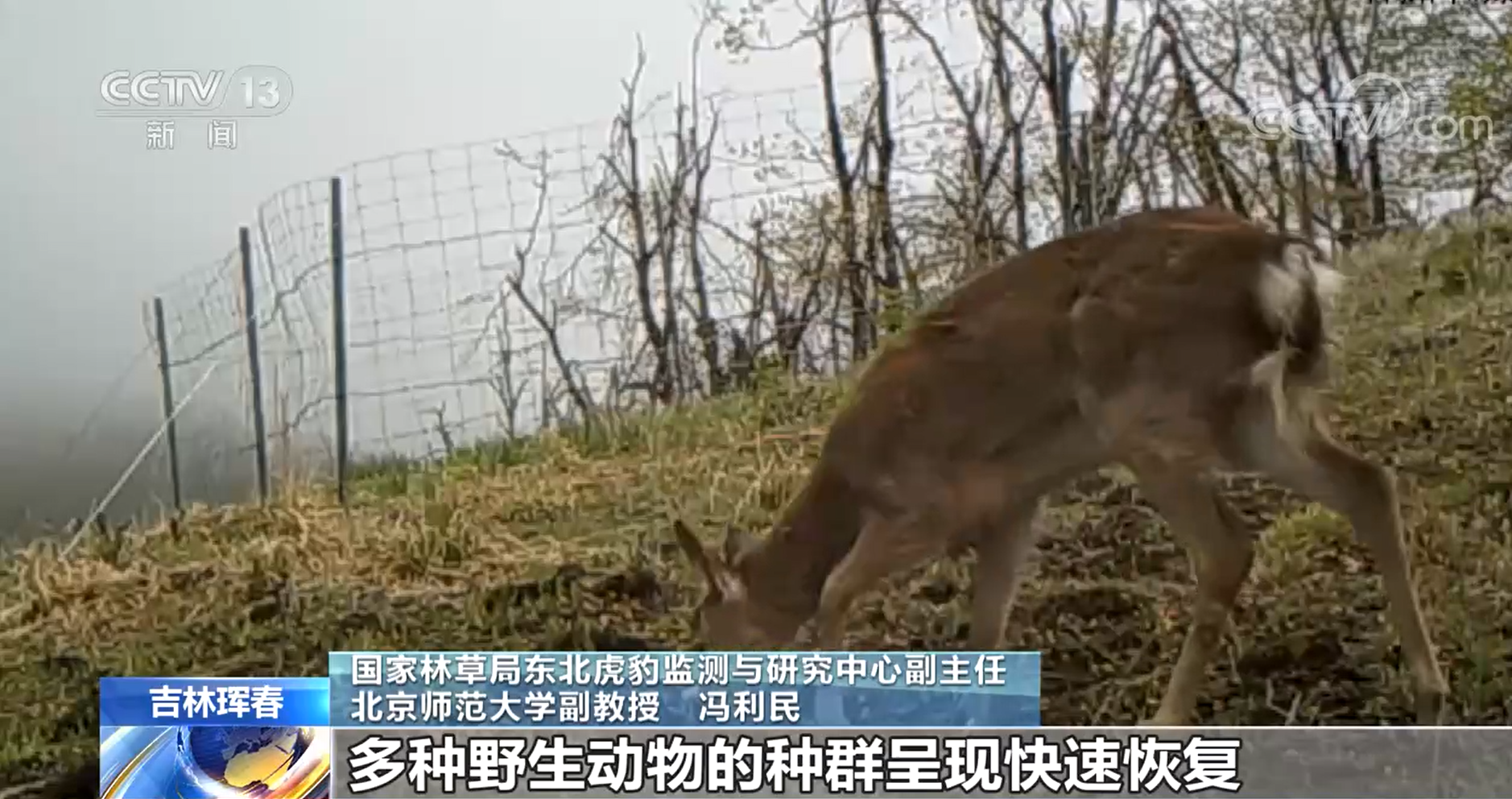
Xinhua News Agency, Beijing, April 18th Question: Ten Questions about the Current Economy of China.
Xinhua news agency reporter
On April 18th, the first quarterly report of China economy was released. In the first quarter, the economic operation continued to recover, the growth rate of major indicators was basically stable, the quality and efficiency of development were improved, and the overall start was stable. However, the world situation has evolved in a complicated way, domestic epidemics have occurred frequently recently, some unexpected factors have exceeded expectations, and the new downward pressure has further increased.
How to look at the economic situation, how to solve the employment pressure, how to stabilize the supply chain of the industrial chain, and how to break the difficulties of small and micro enterprises … … Xinhua News Agency reporters sorted out the top ten concerns about China’s economy and interviewed authoritative departments and people to answer them.
(1) Difficulties and challenges are increasing. How do you view the current economic trend?
Since the beginning of this year, China’s economy has recovered steadily, with positive changes in the first two months. However, in March, due to the changes in the Ukrainian situation and the domestic epidemic, the recovery momentum was under pressure.
What do you think of the current economic situation? How to ensure the realization of the annual growth target of around 5.5%?
Overall, China’s economic operation in the first quarter kept in a reasonable range and started smoothly. The current achievements are not easy.
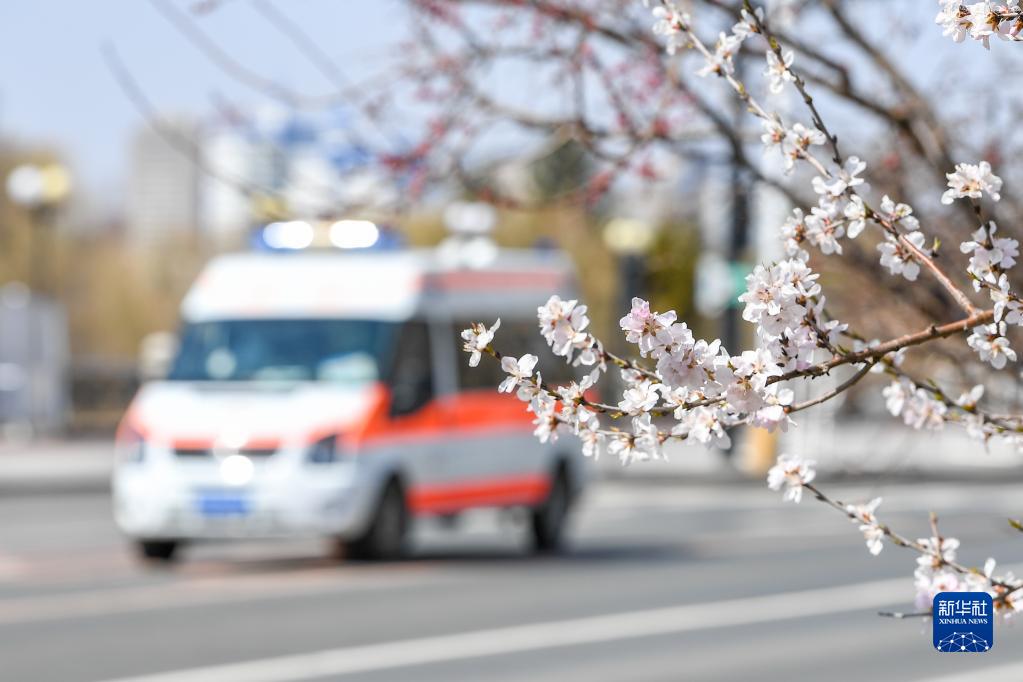
On April 14th, an ambulance passed by Songjiang East Road in Jilin City, and the peach blossoms on the roadside were in full bloom. Xinhua News Agency reporter Zhang Nanshe
The important indicators supporting the macro-economy are generally stable. In the first quarter, the GDP exceeded 27 trillion yuan, up 4.8% year-on-year, higher than the growth rate of 4% in the fourth quarter of last year; The added value of industrial enterprises above designated size increased by 6.5% year-on-year, higher than the two-year average growth rate in 2021; Fiscal revenue has grown steadily, and expenditures in key areas have been strongly guaranteed; Foreign investment and foreign trade continued to maintain double-digit growth, the balance of payments was generally stable, and foreign exchange reserves remained at around 3.2 trillion US dollars.
The transformation and upgrading continued to advance, and many indicators showed the trend of "progress".
In the first quarter, the added value of high-tech manufacturing and equipment manufacturing increased by 14.2% and 8.1% respectively, which was significantly faster than all industries above designated size; The production and sales of new energy vehicles increased by 1.4 times year-on-year; Online retail sales of physical goods increased by 8.8%; Energy consumption per unit GDP continued to decline, and reform and opening up continued to deepen.
At present, the economic operation is facing greater downward pressure, and the difficulties and challenges have increased significantly.
The triple pressures of demand contraction, supply shock and expected weakening faced by economic development have not changed. The domestic epidemic situation is distributed at many points, and some cities press the "slow button", and some of the closed management areas are shut down and stopped production, and the supply chain of the industrial chain is blocked; Difficulties in some industries have increased, and small and micro enterprises are facing operational difficulties; Contact gathering consumption activities such as tourism accommodation, transportation, catering and entertainment are restricted; The employment difficulty of key groups has increased, and the number of employed people in some industries has decreased … …
Since the Central Economic Work Conference was held last year, we have adhered to the principle of "striving for progress with stability". From the central government to the local government, macro-policies, micro-policies, structural policies, science and technology policies, reform and opening-up policies, regional policies and social policies have been accelerated, especially in the near future, we have made further efforts to race against the epidemic and difficulties, and constantly released the power of "stability" in helping the economy climb the hill.
At present, China’s development still has many strategic advantages, such as large economy, wide room for manoeuvre and super-large-scale market. The long-term positive fundamentals will not change, and it has strong resilience and vitality. We not only face up to difficulties, but also strengthen our confidence, adhere to the principle of stability and strive for progress, and strive to achieve the goals and tasks of economic and social development throughout the year.
(2) How to make a good account of the overall epidemic prevention and development?
Since March, the local epidemic has spread to 30 provinces, including cities with trillion-dollar GDP such as Shanghai and Shenzhen, and agricultural provinces such as Jilin. The radiation area is wide and the chain is long, and the downward pressure on the economy is amplified in stages.
Some overseas media and institutions frequently question that strict epidemic prevention in China is "expensive and unsustainable", and there are also arguments in society such as "lying flat" and "coexisting with viruses".
Epidemic prevention and control is "the country’s greatest". Insist on dynamic zero clearing, and calculate big accounts and life accounts. The prevention and control work always puts "people first, life first", which is the primary criterion to judge the effectiveness of epidemic prevention.
Omicron is not a "pandemic influenza". It spreads quickly, with a large number of infected people, and vulnerable groups are at great risk. Among China’s population of more than 1.4 billion, the population aged 60 and over reached 267 million. If it is not strictly prevented and controlled in time, it will inevitably increase the risk of infection among susceptible people. Once a large-scale rebound is formed, it will cause more serious losses to people’s lives and property, and it is easy to lose the hard-won prevention and control achievements in the early stage.
On the other hand, at the beginning of this year, many countries and regions gradually relaxed their epidemic prevention policies, but the result was a sharp increase in the number of cases and deaths. At present, the cumulative number of confirmed cases in the world has exceeded 500 million, and the number of deaths has exceeded 6.19 million. The infection level in Britain has risen to an all-time high since March. Some British media people pointed out that the policy of coexistence with COVID-19 was "tantamount to a gamble".
Then calculate the economic account — — Adhering to scientific accuracy and dynamic zero clearing is to win the initiative for the development of China.
In 2020, it is precisely because China took the lead in controlling the epidemic situation and resuming production in the world that it finally took the lead in realizing economic growth from negative to positive in major economies. In 2021, China’s economy grew by 8.1% year-on-year, with an average growth rate of 5.1% in two years, and its economic development and epidemic prevention and control maintained a leading position in the world.
Omicron mutant spreads fast, and it is more difficult to realize dynamic zero clearing. Closure measures will inevitably bring short-term economic impact, but the anti-epidemic practice in China further proves that temporary "control" is just for better "release".
At present, policies and measures are intensively introduced from the central government to the local government, and efforts are made to achieve the maximum prevention and control effect at the minimum cost and minimize the impact of the epidemic on economic and social development.

On April 13th, in Huapichang Town, Jilin City, Zhang Shouguo (right), director of Jilin Agricultural Mechanization Technology Extension Center, instructed farmers to purchase agricultural machinery. Jilin Agriculture and Rural Bureau has opened up a "green channel" for spring ploughing and transportation, and delivered agricultural materials and agricultural machinery to the villages where farmers are located on time and on demand. Xinhua News Agency reporter Zhang Nanshe
On the one hand, do not miss the farming season to keep the spring ploughing. The central government issued 20 billion yuan to grant one-time subsidies to the actual grain farmers, and the National Development and Reform Commission deployed and put in 1 million tons of national potash reserves … … The agricultural situation scheduling shows that at present, 19.4% of the intended area of spring sowing grain has been completed, and the progress is 1.2 percentage points faster than that of the same period of last year.
On the other hand, race against time to resume work and production. In Shenzhen, it took less than 10 days from pressing the "slow key" to the orderly recovery of social production and life order; Shandong, on March 29th, announced that this wave of epidemic situation since the end of February has been dynamically cleared, and the resumption of work and production has entered the "fast lane"; Jilin, on April 14th, announced the realization of social clearing and the gradual recovery of social production and living order; In Shanghai, the epidemic spread index of this round has dropped from 2.27 to 1.23. On April 16th, the epidemic prevention and control guideline for industrial enterprises to resume work and production & HELIP; …
On the one hand, we will persist in dynamic clearing and create favorable conditions for economic and social development; On the other hand, we must adhere to scientific and precise prevention and control, and prevent layers of overweight from being "one size fits all". Only by making overall plans can we ensure that we will resolutely win this tough battle of epidemic prevention and control.
(3) Can employment be stable in response to unprecedented pressure?
The downward pressure on the economy bears the brunt of employment.
According to the latest statistics, affected by multiple factors, after a moderate start in the first two months of this year’s employment, the fluctuation was obvious in March. In the first quarter, the national urban survey unemployment rate averaged 5.5%, including 5.8% in March.
According to the data of recruitment agencies, this is the traditional peak season in March and April, and the job market is in a downturn. With the increasing uncertainty of environmental complexity at home and abroad this year, can employment be stable?

On April 14th, in the Career Guidance Center of Central South University in Changsha, Hunan Province, students conducted job interviews through the Internet. Xinhua News Agency reporter Chen Si Khan photo
From the perspective of employment demand, the total pressure is increasing. This year, there are nearly 16 million new growth laborers who need to be employed in cities and towns, including 10.76 million college graduates, both of which are new highs in recent years.
From the perspective of job supply, many enterprises and individual industrial and commercial households are facing obvious difficulties, slowing down recruitment, and even reducing staff and layoffs. In the real estate, education and training, internet and contact service industries, the recruitment demand has dropped significantly.
From the perspective of supply and demand matching, the structural contradiction of "difficult employment" and "difficult recruitment" is more prominent. The phenomenon of youth’s slow employment is increasing, and the employment problems of key groups such as college graduates and migrant workers are outstanding. In March, the unemployment rate of urban youth aged 16 to 24 was 16%, the highest in the same period in recent years.
Stabilizing employment has become the top priority of current economic work.
Since the Central Economic Work Conference last year, a distinctive feature is that the employment priority orientation has been further strengthened. Stable employment is placed at the macro-policy level and fully reflected in various policies. This year, the central government allocated 61.758 billion yuan for employment subsidies, an increase of 5.168 billion yuan over last year.
Grasp the basics — — For poor industries such as catering, retail, tourism, civil aviation, highway, waterway and railway transportation, the policy of delaying the payment of pension, unemployment and work-related injury insurance premiums will be implemented; Significantly increase the proportion of stable return of unemployment insurance for small and medium-sized enterprises, up to 90%; Allow local governments to set aside another 4% of the unemployment insurance fund balance for skills training, and issue a one-time training subsidy for small and medium-sized enterprises in difficulty & HELIP; … Do everything possible to stabilize the enterprise and stabilize the post.
Key points — — Study and introduce policies and measures to promote the employment and entrepreneurship of young people such as college graduates, and carry out special actions such as public employment services entering the campus, raising millions of trainee positions, and visiting enterprises by secretaries and presidents of colleges and universities nationwide to promote employment; Organize and implement "Spring Breeze Action" to provide employment services for migrant workers and people out of poverty … … Multi-pronged approach to ensure the employment of key groups.
Expand space — — Strengthen efforts to promote entrepreneurship and promote employment; We will improve the flexible employment policy, carry out pilot projects of occupational injury protection for employees in new employment forms in seven provinces and seven Internet platform enterprises such as Beijing and Hainan, fill in the shortcomings of rights protection, and give full play to the role of flexible employment as a "reservoir".
While implementing the policy of giving priority to employment, we should also do a good job in stabilizing and expanding employment, and go all out to stabilize the basic employment.
(4) How to boost the "double engine" of investment and consumption by releasing the potential of domestic demand?
In the "troika" that drives the economy, investment and consumption constitute domestic demand and are the "main engines" of economic growth.
Actively expanding effective investment is the focus of current macroeconomic policies.
Overall, the growth rate of investment rebounded rapidly and the scale continued to expand. In the first quarter, investment in fixed assets exceeded 10 trillion yuan, up 9.3% year-on-year, better than last year’s 4.9%.
From the structural point of view, infrastructure investment, manufacturing investment and real estate development investment show "cold and warm differentiation".

On April 14th, in the workshop of Harbin Boiler Factory Co., Ltd. of Harbin Electric Power Group, workers carried out production operations. Xinhua News Agency reporter Wang Jianwei photo
In the first quarter, infrastructure investment increased by 8.5% year-on-year, which was faster than the previous two months and 8.1 percentage points faster than last year. It is estimated that Tiegong Shuihang has completed investment in fixed assets of about 636 billion yuan, and sichuan-tibet railway has made steady progress. Since the beginning of the year, it has issued 46.75 billion yuan of funds in the central budget for railways, civil aviation, highways and other fields … … The role of infrastructure investment in stabilizing the economy is prominent.
In the first quarter, manufacturing investment grew rapidly, up 15.6% year-on-year, 2.1 percentage points faster than last year; However, investment in real estate development increased by 0.7% year-on-year, and the growth rate slowed down. Factors such as rising raw material prices, declining enterprise efficiency and epidemic situation may have an impact on expanding effective investment.
Consumption plays a fundamental role in stabilizing the economic market.
In the first quarter, the total retail sales of social consumer goods increased by 3.3% year-on-year, and household consumption was basically stable. The relatively active online retail, the rapid growth of consumption in the new country, the increasing demand of "one old and one small" and the upsurge of ice and snow economy show the great potential of upgrading residents’ consumption.
Under the epidemic situation, consumption recovery is also facing greater constraints.
Compared with the previous two months, the total retail sales of social consumer goods increased by 6.7% year-on-year, and the index in March was negative growth. Among them, the contact aggregate consumption such as tourism accommodation, catering and entertainment, transportation and travel has been obviously impacted — — In March, the business activity index of the service industry decreased by 3.8 percentage points compared with the previous month to 46.7%, and the domestic tourism income during the Qingming holiday was less than 40% in the same period of 2019 … …
The stamina of domestic demand to stimulate the economy depends not only on the strength of expanding effective investment, but also on the degree of promoting consumption recovery.
Actively expanding effective investment is accelerating its efforts — — By the end of March, all the 3.65 trillion yuan local government special bond quota for project construction has been released; The 102 major projects planned in the "14th Five-Year Plan" are being pushed forward, and 71,000 special debt projects have been reserved in various places. The annual investment in water conservancy projects and projects can be about 800 billion yuan … …
Measures to promote consumption recovery have been introduced one after another — — The relief policies for poor industries such as catering, retail, tourism, civil aviation, highway, waterway and railway transportation have been put in place; Do a good job in ensuring the supply and stable price of basic consumer goods to ensure smooth logistics; Expand consumption in key areas, promote the consumption of services such as medical care, old-age care and nursery education, and support social forces to fill the short board of service supply … …
The characteristics of big country’s economy are that domestic demand is dominant and internal circulation is possible. The "Opinions of the Central Committee of the Communist Party of China and the State Council on Accelerating the Construction of a National Unified Market" released a few days ago has injected a strong impetus into expanding domestic demand from a deeper level.
As the second largest economy in the world, China’s large-scale market and huge domestic demand potential mean that the strategy of expanding domestic demand will be firm, and the "engine" of domestic demand to drive the economy needs to be stronger.
(V) Under multiple pressures, can foreign trade and foreign investment continue to grow at a high rate?
Foreign trade and foreign investment, two indicators of China’s outstanding economic performance last year, still performed well in the first quarter of this year, and both achieved a "stable start" with double-digit growth.
In the first quarter, the total import and export of goods was 9.42 trillion yuan, a year-on-year increase of 10.7%; The actual use of foreign capital was 379.87 billion yuan, a year-on-year increase of 25.6%. In the face of repeated epidemics at home and abroad and the increase of new variables in the international situation, it is not easy for the two indicators to continue to grow steadily at last year’s high base.

On April 14th, the first train of Great Wall Motor special train was running on the special railway line of Yongchuan National High-tech Zone in Chongqing (photo of drone). Xinhua News Agency reporter Tang Yushe
What are the reasons for the steady growth of foreign trade?
Trade "friends circle" is more diverse — — In the first quarter, ASEAN surpassed the European Union to become China’s largest trading partner again. China’s import and export of countries and regional comprehensive economic partnership agreements (RCEP) along the "Belt and Road" continued to grow. "the west is not bright and the east is bright." More new markets also mean more room for growth.
More business entities have strong support — — In the first quarter, the number of foreign trade enterprises with import and export performance was 432,000, a year-on-year increase of 5.7%. Among them, the import and export of private enterprises was 4.52 trillion yuan, up 14.1%, accounting for 48%, up 1.4 percentage points year-on-year. Under pressure, the growth of foreign trade subjects is the best proof of resilience and vitality.
Of course, compared with the high growth rate of nearly 30% and 40% in the same period last year, the growth rate of foreign trade and foreign capital in the first quarter of this year has declined.
This is mainly affected by the high base last year, repeated epidemics at home and abroad, and the complex evolution of the Russian-Ukrainian conflict. Many foreign trade enterprises with good orders in the first quarter admit that the pressure will increase in the second and third quarters. The impact of the epidemic on production and transportation, coupled with the erosion of profits by high sea freight, will be further revealed.
In order to stabilize foreign trade, a series of policy measures have been taken in time — — Measures such as tax reduction and fee reduction, smooth logistics, speeding up the progress of export tax rebate, strengthening export credit insurance support, and developing new foreign trade formats have been accelerated, bringing "timely rain" to enterprises and escorting foreign trade.
Considering the high base and some unexpected factors exceeding expectations, it is difficult for foreign trade to continue the high growth last year, but the "stable start" of foreign trade just proves the solid foundation and great potential of China’s foreign trade. China’s industrial chain and supply chain are complete, and enterprises themselves are working hard. Coupled with the help of enterprises and the implementation of foreign trade policies, all parties work together to achieve the goal of maintaining stability and improving quality in foreign trade in the future.
Stabilizing foreign investment also has foundation and confidence — —
According to the recent report of American Chamber of Commerce in China, under the influence of epidemic and other factors, over 60% of the enterprises surveyed plan to increase their investment in China this year, and over 80% of the enterprises in Huamei will not consider moving out of China. Recently, many well-known multinational companies have increased their investment and layout in China around low-carbon business.
In the first quarter, China continued to attract foreign investment on a "stable" basis, and the investment in high-tech industries increased by over 50% year-on-year, with the growth of high-tech service industry approaching 60%. The new opportunity for China to build a new development pattern of generate is the gold spot for foreign investment.
In the face of all kinds of uncertainties, many policy measures are also making active efforts: further strengthening the service guarantee of foreign capital, and coordinating and solving the problem of foreign-funded enterprises returning to work and production; In-depth implementation of the negative list of foreign investment access to accelerate the landing of major projects … …
Under the downward pressure of the economy, China has unswervingly promoted high-level opening-up, implemented national treatment for foreign-funded enterprises, and created a more convenient business environment, so that more foreign-funded enterprises can stay and take root in China.
(6) With the global inflationary pressure rising, will domestic prices rise sharply?
Under the background of widespread inflation in major economies around the world, China’s prices generally operate in a reasonable range.
In the first quarter, China’s CPI rose by 1.1% year-on-year, including 1.5% in March, which was larger than the previous two months, but it was still in a moderate category and lower than the expected domestic target of 3%. In March, the national producer price index (PPI) rose by 8.3% year-on-year, and the growth rate dropped for five consecutive months.
The "scissors difference" between CPI and PPI has further narrowed. In 2021, the "scissors difference" between CPI and PPI was 7.2, and it was 6.8 in March this year, indicating that the effect of ensuring supply and stabilizing prices continued to appear.
Although the PPI rose in March, it was still at a high level. This is closely related to the international import influence. Affected by geopolitical conflicts, international commodity prices continue to rise, driving up domestic prices of oil and non-ferrous metals, and enterprises in the middle and lower reaches are facing higher cost pressure.
In this regard, the relevant state departments have taken timely measures such as two-way regulation of supply and demand and joint supervision of futures and spot markets to stabilize abnormal fluctuations in commodity market prices, stabilize market expectations, and promote PPI growth to fall for months.
At present, the supply of industrial and agricultural products and services in China is abundant, and the ability to effectively cope with abnormal fluctuations in market prices has been significantly enhanced, which still has good support for maintaining the stable operation of prices throughout the year.

Meihekou city, Jilin Province, staff sorting "vegetable bag" dishes (photo taken on April 7, drone photo). Xinhua news agency
CPI index is related to the price of people’s "vegetable basket" and "rice bag".
Recently, the prices of some people’s livelihood commodities, such as vegetables, gasoline and diesel, which have a high correlation with daily life, have increased greatly and have a wide range of increase, which has led to a strong feeling of rising prices among residents, and there is a "temperature difference" between the data and the people’s feelings.
This is mainly because the price of pork accounts for a relatively large proportion in China’s CPI "basket" commodities. Since the beginning of this year, pork prices have continued to decline sharply, with a year-on-year decrease of 41.4% in March, which lowered the CPI increase.
Since the beginning of this year, the prices of some domestic people’s livelihood commodities have risen, mainly due to changes in the international situation and epidemic situation, not changes in the fundamentals of China’s market supply.
As commodity prices continue to run at a high level, the trend of PPI transmission to CPI will continue, and the prices of general commodities will rise slightly. In addition, with the transition of the pork market from the basic balance of supply and demand to the tight balance, it is expected that pork prices will enter the upward channel in the second or third quarter, driving CPI to rise moderately.
On the whole, the annual price increase may be larger than last year. In view of the short-term upward pressure on prices, it is necessary to further improve the price control mechanism. Especially in areas affected by the epidemic, we should strengthen price monitoring and early warning, appropriately reduce the starting conditions of price subsidies, and avoid the impact of price fluctuations on basic people’s livelihood.
(7) Smooth the supply chain cycle of the industrial chain, and how to get through the blocking points?
Industrial products logistics accounts for about 90% of the total social logistics, and more than 90% of the whole process of production supply chain is in logistics. The epidemic situation caused the transportation of some raw materials and finished products to be blocked, which affected the extension to the production end.
At the same time, some factories stopped production due to the epidemic, the price of raw materials rose at a high level, and the cost of enterprises rose … … The superposition of multiple factors has caused people’s concerns about the supply chain of industrial chain.

On April 13th, in Daxing Agricultural Products Logistics Park, Zhougudui, Hefei, the driver scanned the code on the intelligent access control system. The park has set up an intelligent access control system with the functions of temperature measurement, checking Ankang code and data collection, so that drivers and passengers entering the park can check quickly without getting off the bus, realizing the intelligent temperature measurement for epidemic prevention and the traceability of people and vehicles. Xinhua News Agency reporter Du Yu photo
At present, the domestic supply chain is partially blocked, and the uncertain factors affecting the stability of the industrial chain increase. On the one hand, logistics efficiency has decreased. The conflict between Russia and Ukraine disturbed the international logistics order, and the trains in China and Europe and international air transport were affected. The epidemic situation has led to poor transportation across regions and ports in some areas. On the other hand, supply faces some constraints. For example, Shanghai has key industrial clusters such as automobile manufacturing, biomedicine, integrated circuits, etc., and it is also a base for warehousing and product assembly of many processing and manufacturing enterprises. The epidemic will inevitably have an impact on related industries.
Although the challenges have increased, it is mostly due to the short-term impact brought by the epidemic, and the overall operation of the industrial chain is still stable. Controlling the epidemic in time and refining the measures to ensure the smooth supply chain of the industrial chain will add stability and safety to the normal operation.
China has an independent and complete industrial system, with obvious supporting advantages. In the first quarter, the added value of industrial enterprises above designated size increased by 6.5% year-on-year. In March, the added value of 37 industries in 41 industrial categories increased year-on-year. The resilience of industrial economy itself provided strong support for the stability of industrial chain and supply chain.
At present, the key is to focus on blocking points and unblock them in time, to avoid short-term difficulties turning into long-term trends, and to protect enterprises in the "chain" from being dragged down by current problems.
Ensuring logistics is a top priority. Ten important measures to ensure the smooth flow of logistics and promote the stability of supply chain in industrial chain are deployed in the national video conference, which requires efforts to achieve "people’s livelihood should be guaranteed, freight should be unblocked, and industries should be recycled" Announce the national unified vehicle pass for key materials transportation, effectively guarantee the passage of key materials and postal express delivery, and optimize the control measures for epidemic prevention … … While strictly implementing the epidemic prevention policy, a series of deployments have accelerated the opening of the blocking points that restrict the domestic circulation.
Stable production is the key. The white list system of supply chain enterprises with stable key industrial chains in many places across the country is accelerating; The working group in front of the Ministry of Industry and Information Technology rushed to Shanghai to find out the situation of enterprises, and concentrated resources to give priority to ensuring the resumption of work and production of 666 key enterprises.
Focus on the present, do a good job in ensuring the supply and price of raw materials, implement preferential policies such as tax reduction and fee reduction, financial credit, etc., and ease the operating pressure of enterprises; Focus on the long-term, strive to break through the bottleneck of "stuck neck" technology, accelerate the digital transformation of manufacturing industry, and develop "specialized and innovative" small and medium-sized enterprises … … To fight the tough battle of upgrading the industrial base and modernizing the industrial chain, China needs to make continuous efforts to strengthen the chain.
(8) Stabilize market players, and how can we help small and medium-sized enterprises to bail out more effectively?

On April 12th, workers were busy in a textile enterprise in shishi city, Quanzhou, Fujian. Xinhua News Agency (photo by Zhou Yi)
In March and April, which should be the textile peak season, many textile factory owners were in a panic. Affected by the epidemic, some clothing trade wholesale markets temporarily closed down, and textile mills cut production one after another.
In the first quarter, the development index of small and medium-sized enterprises declined, and the indexes of industry, construction, transportation, postal storage, wholesale and retail, accommodation and catering were all below the critical value of prosperity.
At present, many small and medium-sized enterprises are facing challenges such as reduced orders and operating income, increased arrears, high raw material prices, and rising labor and transportation costs. The contradiction of "increasing production without increasing income, increasing income without increasing profits" is prominent, and the differentiation among enterprises continues to expand.
It is a top priority to help small and medium-sized enterprises.
On the one hand, it is necessary to do "subtraction" in operating costs, and tax reduction and fee reduction are the first choice. The scale of tax refund and tax reduction this year is about 2.5 trillion yuan, of which about 1.5 trillion yuan is reserved for tax refund. In order to direct funds to enterprises, the central government has issued the first batch of special transfer payments of 400 billion yuan for small and micro enterprises to stay and refund taxes. Since April, the large-scale tax refund policy has been officially implemented, and within 11 days, 155.7 billion yuan of tax refund funds have fallen into the accounts of 203,000 taxpayers.
On the other hand, it is necessary to do "addition" on cash flow, and credit support can be described as "timely assistance". In the first quarter, the loan demand of small and micro enterprises was further released. At the end of March, the balance of Pratt & Whitney small and micro loans and the number of credit granting households increased by 24.6% and 42.9% respectively.
On April 15th, the People’s Bank of China announced an overall RRR cut of 0.25 percentage point, and an additional 0.25 percentage point reduction for city commercial banks and rural commercial banks with deposit reserve ratio higher than 5%, so as to enhance the ability of financial institutions to provide credit to small and micro enterprises and "agriculture, countryside and farmers".
The National Development and Reform Commission, the Ministry of Industry and Information Technology, the Ministry of Human Resources and Social Security and other departments have successively launched relief measures. The People’s Bank of China has newly set up two special re-loans for scientific and technological innovation and universal pension, increased re-loans for supporting agriculture, and increased financial support for smooth logistics and stable supply chain of industrial chain & HELIP; …
At the same time, Jiangsu introduced "40 measures", Guangdong introduced "47 measures" and Hunan introduced "36 measures" … … From rent reduction to subsidies, various localities have launched more targeted relief measures according to local conditions; Enterprises are also trying to actively "hematopoietic" to save themselves.
Respond to the new difficulties and demands of small and medium-sized enterprises in a timely manner, ensure that the "combination boxing" of burden reduction and relief will be effective as soon as possible, and use real money in the cutting edge, so as to better stabilize the expectations of small and medium-sized enterprises and stimulate market vitality to a greater extent.
(9) How to prevent and resolve risks and guide the virtuous circle and healthy development of the real estate market?
At present, the national real estate market is generally stable. In March, among the 70 large and medium-sized cities, the sales prices of commercial housing in various cities stabilized from the previous month; Investment in real estate development increased by 0.7% in the first quarter, down 3 percentage points from January to February.
The real estate industry is large in scale, long in chain and wide in scope, and plays a decisive role in the national economy. In 2021, the added value of China’s real estate industry accounted for 6.8% of GDP.
Under the influence of multiple factors, such as multiple outbreaks of epidemic, this round of real estate market adjustment is facing new situations and challenges. From the supply side, in the first quarter, the newly started housing area and land acquisition area decreased by 17.5% and 41.8% respectively, and the investment in real estate development grew slowly; From the demand side, due to the shortage of funds and the debt risk of individual real estate enterprises, the market expectation weakened and buyers delayed entering the market.
Since the beginning of this year, the market differentiation has become more obvious. The expectation of market rebound in some hot cities in the Yangtze River Delta and Pearl River Delta regions has gradually increased, and some urban markets with continuous population outflows are still operating at a low level.
In response to the new situation and new challenges, all localities focus on supporting the first set of rigid housing demand, reasonable improvement demand and rental housing demand. Banks in more than 100 cities have lowered their mortgage interest rates independently according to market changes and their own operating conditions; In some cities, if families with two or three children buy the first home, the upper limit of the housing provident fund loan amount will be raised … …
At present, the rental population in Beijing, Shanghai, Guangzhou, Shenzhen, Hangzhou and other big cities has accounted for more than 40% of the permanent population. Increase the supply of affordable rental housing in response to the rental needs of new citizens, young people and other groups. Statistics show that in 2022, the total investment in affordable rental housing for capital construction in China is estimated to be about 850 billion yuan.
To guide the virtuous circle and healthy development of the real estate market, we must firmly hold the position that "houses are for living, not for speculation".
It should be pointed out that the corresponding adjustments made by various localities in view of different situations in the real estate market are not the reversal of real estate control policies. It is necessary to maintain the continuity and stability of regulatory policies, enhance accuracy and coordination, and strive to achieve the goal of stabilizing land prices, housing prices and expectations.
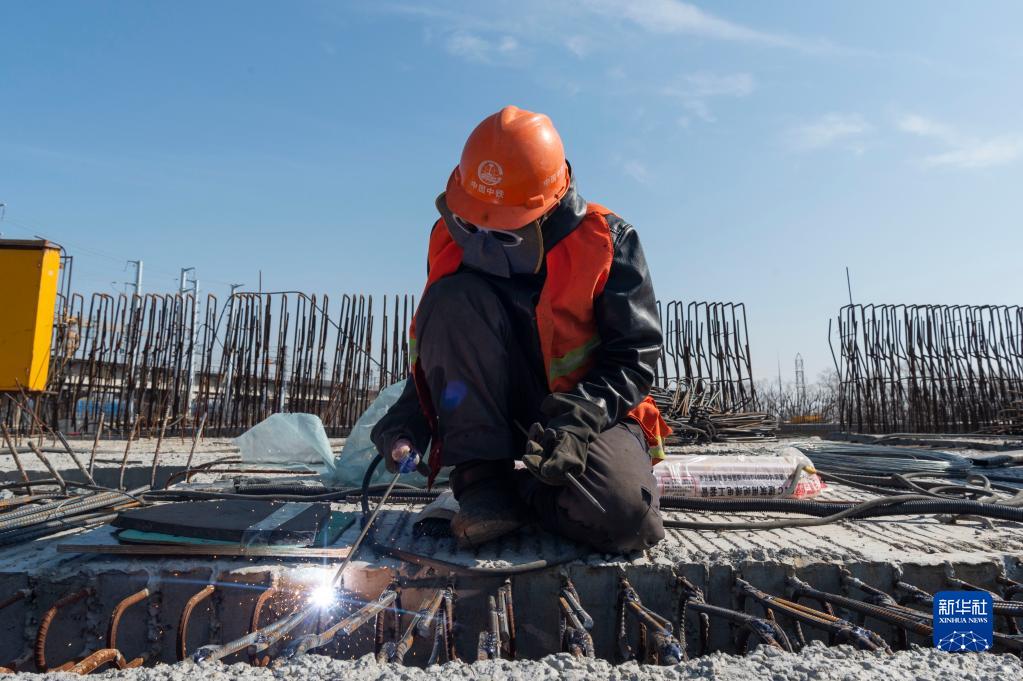
On April 3, in Daowai District, Harbin, workers were working at the construction site of Beimen Street Elevated Project of China Railway No.1 Bureau. Xinhua News Agency reporter Xie Jianfei photo
At present, the debt default risk of individual head real estate enterprises still exists. In this regard, relevant departments and local governments are carrying out risk disposal and resolution according to laws and regulations, with the primary goal of "ensuring the delivery of buildings, ensuring people’s livelihood and ensuring stability" and working together to mitigate the risks of real estate enterprises.
Maintaining a virtuous circle and healthy development of the real estate industry is related to the people’s housing and the stable development of the macro-economy, which is the embodiment of China’s overall development and security under the complicated situation.
(10) Under the multiple challenges, how to ensure the stable supply and price of grain and energy?
Ensuring food and energy security is crucial to the stable and healthy development of the economy and society.
Affected by the rare autumn flood last year, the late sowing area of winter wheat accounted for one third, and the proportion of first-class and second-class seedlings has basically remained the same as in previous years. Under the closed management in some areas, the swing of agricultural materials, straw leaving the field and the return of agricultural workers are affected to varying degrees.
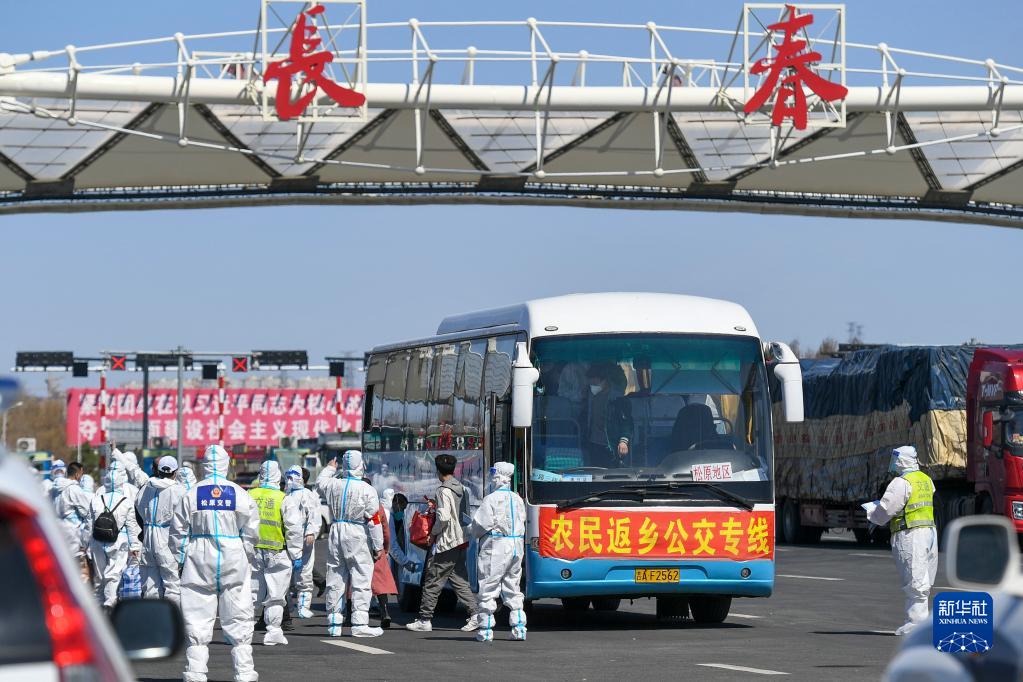
At the east exit of Jilin Changchun Expressway, returning farmers boarded the returning bus line (photo taken on April 12). Xinhua news agency
The price of agricultural materials has risen. In the second week of April, the wholesale prices of urea, diammonium phosphate and potassium chloride increased by 35.5%, 17.9% and 82.4% per ton year-on-year, and the price of agricultural diesel oil rose sharply. Nearly 30% of China’s potash consumption is imported from Russia and Belarus. Due to the conflict between Russia and Ukraine, the exports of the two countries are blocked.
Risks in the international market have increased. Last year, nearly 30% of corn and barley imported by China came from Ukraine. The export volume of wheat and corn from Russia and Ukraine accounts for 29% and 19% of the global trade volume. The conflict between Russia and Ukraine has triggered an increase in international food prices, increasing the difficulty and cost of China’s import. In the first quarter, China imported 20.28 million tons of soybeans, the quantity decreased by 4.2% year-on-year, but the amount increased by 20.9%, highlighting the increase in the price of imported soybeans. Soybean and corn, as feed raw materials, are directly related to the aquaculture industry and easily affect the price of meat.
At present, China’s basic policy of stabilizing grain has not changed, and the country is taking a series of measures to ensure that China’s rice bowl is firmly in its own hands:
Strong reserves. The total grain output has remained above 1.3 trillion Jin for seven consecutive years, and the grain inventory is at a historical high level. In particular, the two major grain rations, wheat and rice, account for more than 70% of the total inventory, and their ability to prevent risks has been enhanced.

On April 12, farmers in Yangwan Village, Cailing Town, duchang county, Jiujiang City, Jiangxi Province drove agricultural machinery to work in the field. Xinhua News Agency (photo by Fu Jianbin)
Guaranteed output. At present, the transformation of wheat seedling situation is better than expected, and the intended planting area of grain has increased steadily. All localities should pay close attention to spring sowing, and relevant departments should take measures to ensure the supply of potash fertilizer. China will increase the supply of corn and soybean, expand the soybean planting area in Northeast China, promote the strip-shaped compound planting of soybean and corn, ensure the completion of the task of expanding soybean oil seeds, make rational use of international resources, strengthen the regulation of reserves, and maintain the balance between supply and demand. This year, the area of winter rape has increased and its growth is better than that of last year.
Ensure production capacity. This year, China will build 1 billion mu of high-standard farmland, stably guarantee the grain production capacity of more than 1 trillion Jin, accelerate the implementation of the national black land protection project, increase the comprehensive utilization of saline-alkali land, and vigorously implement the soybean and oil production capacity improvement project.
Affected by the conflict between Russia and Ukraine, international energy prices are soaring, and the risks faced by foreign oil and gas procurement are rising. In the first quarter, the amount of natural gas imports increased by 68.7% year-on-year, but the actual import volume decreased by 5.1%.
Many parties are taking measures to promote the storage and production of domestic oil, natural gas and coal. A good trend is that in the first quarter, the output of industrial raw coal, crude oil and natural gas above designated size in China increased by 10.3%, 4.4% and 6.6% respectively, and the power generation increased by 3.1%. This year, the country will achieve the goal of returning the crude oil output to 200 million tons, and the natural gas output will continue to increase steadily, and accelerate the construction of large-scale wind power photovoltaic bases planned in deserts, Gobi and deserts.
Based on the national conditions, strengthen the role of coal, coal and electricity. In recent months, the National Energy Administration has approved several coal mine projects in Shanxi, Shaanxi, Ningxia and other places, and the release of high-quality coal production capacity is accelerating according to laws and regulations. Recently, the national coal output has remained at a high level. Since the middle and late February, the daily output has been over 12 million tons, an increase of more than 10% year-on-year.
Relieve the operating pressure of coal-fired power enterprises. After fully liberalizing the on-grid tariff of coal-fired power generation, this year, we will further improve the coal market price formation mechanism, guide the coal price to operate in a reasonable range, promote the coordinated development of upstream and downstream of coal-fired power generation, and ensure the safe and stable supply of energy. Through the construction of energy storage and transportation capacity, the flexibility and toughness of energy supply chain will also be strengthened.
Ensuring food and energy security is a major strategic and fundamental issue. Only by firmly holding the bottom line of safety and taking the initiative of development in our own hands can we better cope with the uncertainty of the external environment with the certainty of our own development.
After a smooth start, it is even more necessary to move forward. In response to the downward pressure, relevant authorities said that on the one hand, it is necessary to adhere to scientific accuracy and dynamic clearing, and control the current epidemic as soon as possible; On the other hand, it is necessary to seize the second quarter window period, implement various measures to stabilize growth, and ensure stable and healthy economic and social development. (Reporter Han Jie, Xie Xiyao, Wei Yukun, Liu Xiacun, Wang Youling, Wu Yu, Ye Yuming, Jiang Lin, Zhang Xinxin, Yu Jiaxin, Yu Wenjing, Gao Jing, Zhao Wenjun, Wang Yueyang)
